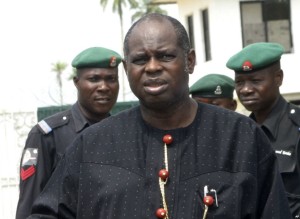 A lesson in legacy and democracy
A lesson in legacy and democracy
IT is a telling lesson on the importance of positive performance in power that former Bayelsa State Governor Diepreye Alamieyeseigha reportedly rushed back to the country from Dubai, where he was receiving medical attention, out of fear of extradition to the UK to face corruption-related charges. His death at the University of Port Harcourt Teaching Hospital on October 10, aged 62, seemed like the culmination of insecurity out of power, though official sources said he “died of complications arising from high blood pressure and diabetes which affected his kidney.”
No less a person than Bayelsa State Governor Seriake Dickson confirmed that a feeling of insecurity was a major factor in the tragedy. Seriake said in an emotional state broadcast that reflected the sense of loss of Alamieyeseigha’s Ijaw ethnic group: “We acknowledge the anger, the genuine sense of anger and disappointment, and the outrage held by our people at home and in the diaspora and all well-meaning Nigerians and lovers of justice around the world for the way our leader was harassed, pounded and forced to abandon his treatment abroad. We condemn…the propaganda and the orchestrated harassment that led to his untimely death.”
It is noteworthy that, in the end, a controversial 2013 state pardon of Alamieyeseigha by former President Goodluck Jonathan proved inadequate to redeem him as he remained wanted in the UK where he was facing money-laundering charges but escaped mysteriously to safety in Nigeria. It is understandable that he was still haunted by the possibility of prosecution in London, after jumping bail in 2005, and got jittery in Dubai following reports that the UK had requested his extradition.
Alamieyeseigha came to politics from a military background, having been trained at the Nigerian Defence Academy. He retired from the Air Force in 1992 as a Squadron Leader. His re-election as governor in 2003 on the platform of the Peoples Democratic Party (PDP), after a four-year term, resulted in an unravelling from which he never recovered.
There is no question that Alamieyeseigha who governed oil-rich Bayelsa State from 1999 to 2005 was stained by official corruption. While still in office, he had one million British pounds stashed in his London residence; the loot was discovered during a search by London Metropolitan Police. Another hefty sum of almost two million British pounds was found in his bank account in the UK.
He lost his governorship position when he dramatically surfaced in Nigeria and was impeached by the Bayelsa State House of Assembly. His subsequent prosecution by the Economic and Financial Crimes Commission (EFCC) resulted in a plea bargain after he pleaded guilty to theft of public funds and money laundering. He forfeited money and property to the government, and got a two-year jail sentence in 2007. He reportedly spent no more than two days in the cage post-sentence, having been held in detention for two years since his apprehension.
Notwithstanding the foregoing, the man famously called “Governor General of the Ijaw Kingdom” was intriguingly hero-worshipped by the Ijaw. He was credited with the establishment of the state-owned Niger Delta University and enjoyed the confidence of Ijaw nationalists. It would appear that, to his ethnic group, his failure to achieve socio-economic development that matched the state’s rich resources was a pardonable inadequacy.
From a more objective viewpoint, Alamieyeseigha’s power years cannot be described as exemplary, particularly in a country faced with serious developmental challenges. He may not have appreciated the virtue of spending public money for public purposes. His legacy is not an edifying lesson. He proved not to be the kind of political leader that should be emulated.
NATION
END

Be the first to comment